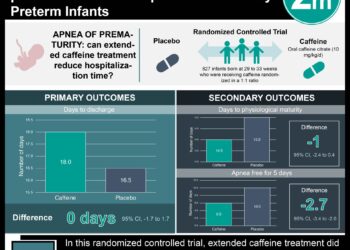Moderate caffeine intake may not be associated with cardiometabolic pregnancy complications
1. Low to moderate caffeine intake (<200mg per day) compared to no caffeine intake was associated with lower risk of gestational diabetes.
2. Low to moderate caffeine intake was not associated with risk of preeclampsia.
Evidence Rating Level: 2 (Good)
During pregnancy, women are recommended to consume less than 200mg of caffeine per day to prevent potential pregnancy complications. However, whether caffeine exposure during early or mid-pregnancy is truly associated with differential risk of maternal complications has not been extensively studied.
This prospective cohort study examined 2802 non-obese, non-smoking, pregnant women across the United States (US). Women who conceived using fertility medications or in vitro fertilization, or had prior pregnancy complications or major chronic diseases were excluded. The amount of caffeine consumed daily was surveyed at 10-13 and 16-22 gestational weeks based on self-reported consumption of caffeinated coffee, tea, soda, and energy drinks. The primary outcome was diagnoses of cardiometabolic pregnancy complications such as gestational diabetes (GDM), preeclampsia, and gestational hypertension (GH).
Within the cohort, 599 (23.6%) patients reported consuming no caffeinated beverages, 1734 (68.3%) consumed between 1-100mg/day and 186 (7.3%) consumed 101-200mg/day. Compared to those who consumed no caffeine, patients who consumed 1-100mg/day had 47% reduction in risk of GDM but no change in risk of preeclampsia or GH. However, this study was limited in that the sample size was not large enough to conduct separate analyses based on beverage type. Furthermore, time of diagnosis of GH and preeclampsia was unknown. Nonetheless, this study would lend support to current recommendations for women to not consume more than 200mg/day of caffeine. Furthermore, these findings may be reassuring for women with low-moderate caffeine intake during pregnancy.
Click to read the study in JAMA Network Open
Image: PD
©2021 2 Minute Medicine, Inc. All rights reserved. No works may be reproduced without expressed written consent from 2 Minute Medicine, Inc. Inquire about licensing here. No article should be construed as medical advice and is not intended as such by the authors or by 2 Minute Medicine, Inc.






